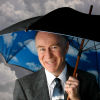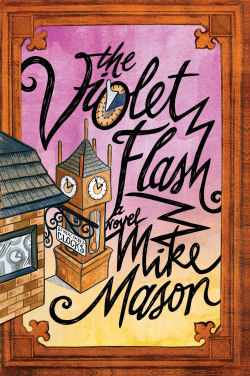
Mike Mason has been a full time writer for thirty years, with ten books to his credit, including The Gospel According to Job and the Gold Medallion winner The Mystery of Marriage. The Blue Umbrella, a children’s fantasy, was nominated for a Christy award in 2010. Mike has an M.A. in English Literature and has studied theology at Regent College in Vancouver. Married since 1982 to Karen, a family doctor, they live in Langley, British Columbia. Their one daughter, Heather, born in 1987, is pursuing dance studies. All in all Mike enjoys a simple life filled with family and friends, a dog, books, music, and prayer. More at www.mikemasonbooks.com |
|
Children’s Fantasy: More Real Than Realism |
|
|
When I first dreamed of being a writer, at about age eleven, I wanted to write stories. I read fiction, and I assumed it’s what I would write. What other kind of writing was there? However, I became a Christian at twenty-eight, and suddenly fiction faded into the background. Excited about my new faith, I wanted to write about that. In fact, having been converted through reading Thomas Merton, I could envision no higher vocation than to follow, however haltingly, in his footsteps. It was the combination of his beautiful faith and just as beautiful writing style that drew me to Merton, and that’s what I wanted to emulate. Lots of Christians wrote books, but very few (in my opinion) wrote good literature. So my course was set, and over the next twenty years I published a string of devotional books. For me, writing emerges not from what I know but from what I don’t know. It’s an act of exploration, and being at the cutting edge (at least, my own cutting edge) keeps my writing fresh. All those years of producing nonfiction, I was simply exploring my own developing relationship with God. I think I was trying to answer some basic questions for myself. Most basic of all: How can I know, really know and experience and live in, God’s love? Although I was married, I thought of myself as a kind of monk. My first commitment was to prayer, and writing flowed from there. Little did I realize that an equally strong vocation was that of artist. For many years I kept my aesthetic soul happy by just trying to write as beautifully as I could. But my inner artist was languishing. Besides, I eventually answered my question. My last devotional book, Champagne for the Soul, was on the topic of joy, and by the time I finished it, I felt I had learned to live every day in the love of God. For joy comes from love, and I’d learned what it is to love and be loved. What more was there to say? As a devotional writer, I’d written myself out. At that point I remembered my dream: to write fiction. I’d published some years earlier, but my books of short stories hadn’t sold well and I’d grown discouraged. A sign in a remedial reading lab states: “Nothing is more courageous than to return to a place where you have failed, and failed, and failed again, and to try once more.” Maybe it was time to take another look at my urge to write stories. I don’t know which came first, reading children’s books or the idea of creating one myself. But as I approached the age of fifty, I became fascinated with children’s literature. I couldn’t get enough of it. For ten years I read little else. How marvelous to discover this treasure trove as an adult! I suppose it has helped to keep me young. But more than that, it opened up a new way to continue pursuing my love of God, a new way of thinking about Him. The rational side of my brain was exhausted. I needed images, metaphors, adventures, stories! New worlds, dragons, fairies, villains, heroes, magic—all of this began to speak to me about reality in a way that nonfiction never had, never could. I was hooked. And so I began to write one of these wonderful books for myself. I thought it would be easy. Compared with the kind of writing I had been doing, I thought it would be a walk in the park. How wrong I was! Very soon into the process I realized that I didn’t have a clue what I was doing. Though I’d written stories, I’d never completed a novel, and the two forms are entirely |
different. But I was at a point in my life where I needed a new challenge, and I definitely got it. In the midst of such a steep learning curve, I often felt lost. Never before had the blank page so terrified me. Could I really do this? How would my story end? What was going to happen next? There’s nothing like fiction to test a writer’s limitations. So many balls to keep in the air: character, dialogue, description, pacing, plot . . . especially plot. That was my big weakness. How to keep a story moving over the long haul of 400 or so pages? The part that came easily to me was the fantasy genre itself. I loved playing with the possibilities of magic: a setting in which anything at all might happen at any time; portals leading to other worlds; objects with hidden powers; characters who are much more than they appear to be; a clear battle between good and evil—such features seemed to me to reflect the true nature of the Christian life always poised between two worlds. I didn’t set out to write Christian fantasies. Not at all. I was done with trying to tell anyone about God. I just wanted to tell a good story. But discovering the genre of children’s fantasy enabled me to resolve the tension in myself between these two callings. As C. S. Lewis said of his Chronicles of Narnia, “At first there wasn’t anything Christian about them; that element pushed itself in of its own accord.” I was very surprised at the spiritual depth that developed in my fiction. But I’m also pleased that my novels can, I think, be enjoyed without the reader being fully aware of this other dimension. If a story works well in its own right, then its spiritual truth can still be felt as a resonance, a perfume, that lingers in a reader’s heart. And so my first children’s fantasy novel, The Blue Umbrella, was published in 2009, followed by The Violet Flash in June 2011. I’m very proud of these books because I feel they come from a deeper place in me than my other writing. Our greatest gifts reside deepest within and are consequently hardest to uncover and release. Finding the courage to identify myself as a novelist and struggling through every difficulty to give birth to two long fantasies meant undertaking an epic journey in my own life. Like my protagonists, I too had to face down villains, slay monsters, slog through darkness, and eventually emerge into the light. As I look at my writing life now, I see the battlefield strewn with the corpses of my enemies, and I am a new person.  |
|
|
|
|
|
|








